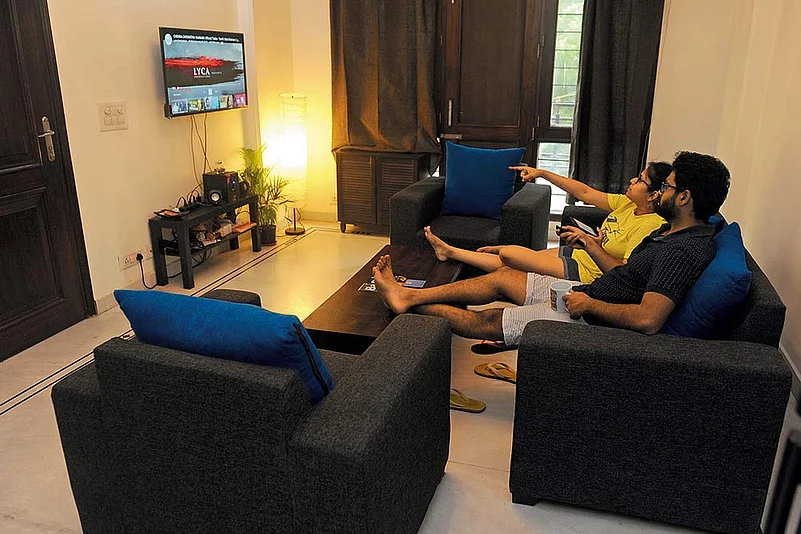If my life is for rent and I don’t learn to buy
Well, I deserve nothing more than I get
‘Cos nothing I have is truly mine…
—Life for Rent, Dido
Boyfriends on hire? Just to feel a little better about yourself? The idea seems a bit far out, if not faintly condescending. Why on earth would women need rented boyfriends to cope with depression? But that’s exactly what this new mobile app claims…and the promoters say they’ve been flooded with calls from interested women! One among them is Deepika, a Mumbai girl who self-admittedly wants to take a stab at it to get out of her “extreme shyness” in front of men. “My parents are pressurising me to get married, and I too want to have a partner. But I’m so shy I can’t even talk properly to guys. Who knows, maybe this will help. After all, there’s nothing to lose,” says the 24-year-old, giggling, “I’ll only be renting him.”
Marketing professional Shruti Roy, 28, is in no need of a hired beau. She’s found her soulmate: they were married recently, and an Instagram-worthy honeymoon soaked in the Italian sun duly followed. For the young couple, life is good. Walk into their Delhi apartment, and you’ll be struck by the opulence—beige walls hugging an ash-coloured sofa with teal blue cushions, a delicately cut wooden centre table, a beautiful potted plant standing saint-like next to a wide-screen TV. Then she tells you… “All rented, just like the apartment.”
‘Rented apartment’ is of course as old as the hills. Shruti offers it as an analogy so that the more old-worldly among us get what she means. For, young Indians are now renting virtually everything they use in life: chic furniture, fancy cars, home appliances, haute designer wear, cool UV-protected shades, even pets. It’s urban India’s new life hack.
So, back from the party, slightly peckish, you slip the red Jimmy Choo stilettos into the solid mahogany shoe rack in the hallway, keep away the Ford Mustang keys somewhere safe, tiptoe barefoot over the parquet floor to the open kitchen and shove in your ready-to-eat chana masala in the convection microwave… (Remember the motto: all rented.) If you don’t recognise yourself there, you’re likely Jurassic. India’s yuppies are gliding through life with balletic ease. The reason: they own nothing. No Gandhian austerity, this—the generation is nothing if not brand-aware and giddily materialistic. It’s just that owning is passé. The young ’uns are developing a mild aversion to the old idea of forming deep bonds with things. And merely surfing through the world of objects sits pretty easy on the pocket and offers way better options.
For those bred and buttered in an earlier, neon-tinted age, everything-on-rent may seem an inconceivable ideal. They spent their youth trying to acquire and solidify assets—accumulating, hoarding, squirrelling away for the winter. They sought permanence. A pucca house, a geyser that lasted decades, a ragtop convertible that was as much part of family holidays as the Pomeranian. True, out in the hinterland, they were always renting farm equipment—tractors, combine harvesters, threshers—but that was because the less endowed farmer couldn’t afford to buy them. They would, if they could. The young rent-happy crowd couldn’t care less.
Temporariness also makes eminent sense on the other side, by all accounts. The business of hired things is booming, with start-ups—and upstarts—disrupting the traditional model of buying and selling. The exact size of the rental market is still a guesstimate, but business insiders believe it to be around $3 billion with the potential to reach an estimated $25 billion by 2023 (see box).
But it’s the all-new attitude this business feeds that’s intriguing—a strange blend of desire and letting go. “It’s a result of the instant gratification the youth need today,” suggests psychologist Seema Hingorrany. “They’re introduced to brands at an early age…people’s self-image these days depends on what brands they carry and wear. But not everybody is making that kind of money to buy those brands.” She spots one good thing about the trend. “The youth today are very particular about not borrowing from their parents, they want to be independent. That’s where the whole idea of renting has caught on from.”
Plain pragmatism is at play too. Renting is much easier than owning things for people frequently on the move, says Shruti. Imagine a young, single IT professional. No need to call packers and movers when you shift from Bangalore to Pune to Gurgaon—your rental company simply carts things away at the end of each stint, and you go on to new furniture, in sync with the bachelorette pad in your new condo. You measure out life with spoonfuls of instant coffee.
Ajith Karimpana is a convert who turned his moment of revelation into a business. Upon returning from the US, he realised his carefully curated furniture had become a liability back in India. New space demanded new fixtures; his precious old ware sold for peanuts. “That’s how Furlenco happened,” he says about his online furniture rental. “Most people these days keep moving houses. But furniture manufacturers don’t make their stuff thinking you’ll move them around,” Karimpana adds.

Established in Bangalore as an offline entity in 2012, Furlenco started with expats, who were more used to the concept. “We gradually shifted online. Honestly, there was no market…it had to be created. It’s not like people were looking for furniture on rent,” Karimpana says. Cut to 2018, and Furlenco is flourishing, with 55,000+ subscribers in Delhi, Gurgaon, Noida, Pune and Mumbai. And new entrants like Rentomojo, Clado, CityFurnish and Fabrento are pandering to citizens with a passing fancy for the king-size bed, the leather sofa, sheer curtains that let the light streaming in onto the sleek Malaysian wood study table, even the MacBook Pro on it.
Owning has become an exception not only with regard to ordinary utility objects, but also things traditionally considered ‘personal’ or seen as symbols of success—cars, even wedding jewellery. “And why not?” asks Nandini Pain, a Mumbai-based sales executive who has been living away from her family in Calcutta for over five years . “Our parents had bought a house thinking their children would live there. But we didn’t stay back in our hometowns. In fact, most of us might not even be in the country.”
It’s a kind of gypsy life—and a rolling stone gathers no moss. And an ease develops around the idea of unbelonging. Pursuing her masters in Bhubaneswar last year, Pain and her friends pooled in to hire from self-drive pioneers ZoomCar. “We’d rent a car while moving house or to practise driving. Who spends so much money buying a car for that? There are ZoomCar parking spaces outside hostels in Bhubaneswar! A big seven-seater cost us only some Rs 5,500 for 400 km. And you don’t have to worry about washing your car!” she laughs.

Shruti Roy and Sriram Manohar at their Delhi apartment, with most of their furniture and appliances rented
The economics of it is only half the logic. Yes, objects of desire are exorbitant, so renting offers a handy short-cut. But it’s the way of life—a kind of modern nomadism—that itself seems to demand letting go of roots and attachments. It’s not the social meltdown of Japan where they rent husbands and wives and grandparents, just the first flush of a floating global citizenship. From ‘permanent addresses’, people have graduated to living in multiple homes across cities or countries, often working miles away from base camp. The focus, therefore, has shifted to “creating experiences” over owning things.
“I’d much rather spend my Rs 37,000 on buying a ticket to Europe, instead of on a wedding lehnga I’ll probably never wear again,” says Anjali Luke, a Toronto-based contract specialist who recently tied the knot at a lavish ceremony in India. Luke simply rented a lehnga for her sangeet from Stage3, a clothes rental in Delhi’s Hauz Khas Village. “It was a win-win situation. The kind of outfit I wanted would never fit into the budget I had. I’d gone all over Delhi searching, in vain. But the moment I stepped into Stage3, I knew I’d found something much better,” Luke says.
Designer bridal couture can set you back by a few lakhs, while you can rent your favourite label for D-Day at one-fourth the cost. Is there a flipside? “A very marginal one,” says Luke. “Sometimes, the clothes you like might be a little frayed here and there, but then there are so many options that it doesn’t matter. End of the day, we are no Tata or Ambani. Why not spend those twenty lakhs on higher education instead of a designer dress you’ll only wear for six hours?”
Men too seem to have embraced the idea of looking dapper in borrowed robes for important occasions. Shikhar Nigam, a journalist in Delhi, stares fondly at his college convocation photo where he can be seen wearing an impressive black suit. “It cost me only a thousand bucks. Can you believe that?” he says with a satisfied grin. “The same thing would have burned a huge hole in my pocket had I thought of buying it,” Nigam says. The process is fairly easy, he explains. Drop in at a clothes rental, spend a few minutes giving your measurements, and take home a freshly laundered outfit for the big day. “Damages, if any, incur negligible charges,” he adds. Nigam’s sister too rented her entire wedding attire, including jewellery, from a shop in their hometown Kanpur earlier this year. “I would anyway never have been able to wear my wedding dress to someone else’s wedding again, isn’t it?” reasons Harshita Nigam.
Another big change from the days of ‘solid’ things? You guessed it: social media and its will o’ the wisp affectations. Instagram demands that you constantly look good. And repeating clothes is a strict no-no in the fashion bible! Ask Neeraj Wadhera, founder of Wrapd, an offline clothing rental operating in Delhi, Faridabad, Hyderabad and Jaipur. She says social media sites “have become a problem” for the new-age fashionista—“you need something new for every occasion and that’s where we come in.” Wrapd started catering to this need for the ephemeral back in 2009. “We actually have more men than women clients. And we mostly cater to the non-bridal section,” she adds.

Young couples like this rent their apartments, the stuff in it, even pets to cuddle
There are other variables: goods themselves tend to have a shorter shelf-life these days, as abbreviated as our attention spans. Plus, fashion is forever in flux. And new technology perpetually courts obsolesence: newer stuff is always being invented. Our affairs with things are anyway temporary: so renting makes sense. But affairs of the heart? Kitchenware and wedding costumes are one thing; do pet dogs (and boyfriends) weigh in on the same ethical plane?
Kaushal Prakash, founder of the Rent a Boyfriend app, insists the companionship his firm offers is purely platonic. “Everyone is verified on our platform so there’s no chance of paedophilia or things like that,” he says. The company, which caters to only Pune and Mumbai as of now, spoils its takers for choice with three categories of ‘boyfriends’: commoners, models and celebrities. The rate per hour can be anything between Rs 400 and Rs 4,000. “The ‘boyfriends’ are not allowed to share their personal numbers with the clients. Private meetings are also not allowed: the app keeps a check on the venue when someone makes a booking,” Prakash adds. You may defer a judgement on his venture, but he believes this growing lonely-hearts club—he has some 6,000 clients so far—is an index of a genuinely felt need. “And it’s not just for women. Anyone of any gender can rent a boyfriend,” he says.
There was no ethical dilemma for Viren Sharma, founder of the Jaipur-based Mad About Dogs, which has launched a rental service catering to Pune, Mumbai and Jaipur. He plans to spread to a hundred Indian cities in the next phase. A dog behaviorist by profession, Sharma believes renting a pooch is anything but commodification. “I want to let people know the feeling of living with a puppy. It’s about introducing people to dogs and letting them get over their fears,” he says. Sharma’s aim is to “convert” sceptics into believers. “Families take dogs on rent and adopt them ultimately. Till now, I’ve rented out over a 100 dogs and I can safely say none of them came back to me,” Sharma says. “In many cases when they return dogs, they feel the void and invariably come back to take them home again.”
That, then, is a slightly different template. As for the general ethos, Calcutta-based writer Devalina Mookerji conveys it without much ado: “Honestly, it’s a pain to buy and maintain things.” A trekker by passion, 43-year-old Devalina has mostly chosen to rent her mountain hiking gear of late. She has also rented most of her furniture and feels immensely satisfied with her hired haul since 2013. “It just suits my lifestyle,” she adds.
Everything-on-rent is, at heart, a barometer of deep social change. As psychologist Hingorrany says, “Earlier generations were more rooted, this is a generation of nomads. They’re fast-moving and they don’t seek comfort or status in a piece of furniture anymore.” Dido’s song hit the basic notes with the lines: “I haven’t ever really found a place that I call home/I never stick around quite long enough to make it”. The young Indian has arrived at this departure lounge, and she would rather leave the baggage behind.
***
Take ’Em Out, Turn ’Em In
Peruse these underneath. Admit, your favourite things are on rent.
Clothes and accessories
- App/Website/Store name: Wrapd, Stage3, Flyrobe, Rent It Bae
- Cities available: Delhi-NCR, Jaipur, Hyderabad, Calcutta, Bangalore, Pune, Chennai, among others
- Pocket pinch: variable
Boyfriend
- App/Website/Store name: Rent a Boyfriend
- Cities available: Mumbai & Pune
- Pocket pinch: Rs 400-Rs 4,000
Dogs
- App/Website/Store name: Mad About Dogs
- Cities available: Pune, Mumbai, Jaipur
- Pocket pinch: variable
Furniture and appliances
- App/Website/Store name: Furlenco, Rentomojo, Clado, CityFurnish, Fabrento
- Cities available: Delhi-NCR, Mumbai, Bangalore, Pune, Hyderabad, among others
- Pocket pinch: variable
Self-driven cars and cycles
- App/Website/Store name: ZoomCar
- Cities available: Most tier 1 and tier 2 cities
- Pocket pinch: variable


























